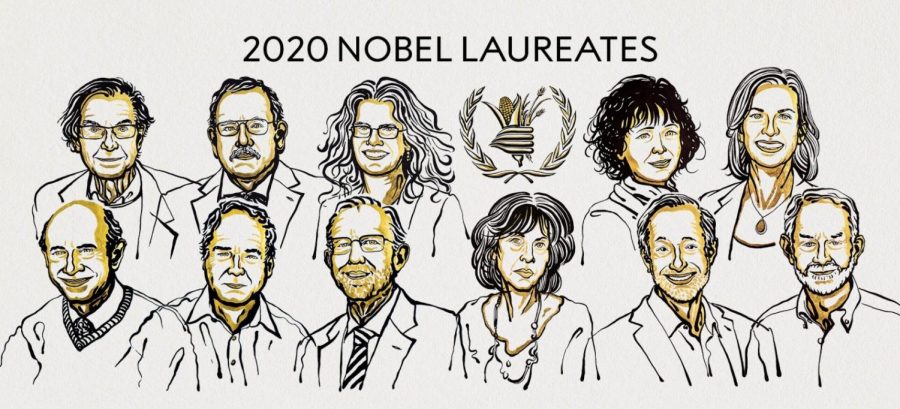2020 Nobel Prize Winners Announced
Niklas Elmehed/Nobel Media. III.
The 2020 Nobel Laureates across the Prize’s six categories were honored in a virtual ceremony this past week.
October 21, 2020
Last week, the winners of the six Nobel Prize categories were announced. Since 1901, the Nobel Prizes have been awarded 603 times to 962 people and organizations by the Nobel Foundation in Stockholm, Sweden. Each year, six prizes are awarded for individuals and organizations who have made “the greatest benefit to humankind” in the physics, chemistry, medicine, literature, peace, and economic sciences categories.
In his will, opened and read in 1895, Alfred Nobel declared, “All of my remaining realizable assets are to be disbursed as follows: the capital converted to safe securities by my executors, is to constitute a fund, the interest on which is to be distributed annually as prizes to who, during the preceding year, have conferred the greatest benefit to humankind.” He distributed his wealth between five prizes, each to be awarded yearly for the best work in physics, chemistry, medicine, literature, and peace. Because of the controversy over Nobel’s will in Sweden and internationally, the Prizes were not awarded until 1901. The economic sciences prize, formally known as the Prize in Economic Sciences in Memory of Alfred Nobel, was later established in 1968 by Sveriges Riksbank, Sweden’s central bank.
Under normal, non-pandemic conditions, the Nobel Prizes are presented to recipients during a ceremony in Stockholm and Oslo in December. This year, the events in Stockholm were canceled and replaced with a virtual ceremony.
2020 Nobel Prize Winners
The Nobel Prize in Physiology or Medicine (Monday, October 5, 2020)
The Nobel Assembly at Karolinska Institute announced that the 2020 Nobel Prize in Physiology or Medicine was jointly awarded to Harvey J. Alter, Michael Houghton, and Charles M. Rice for their discovery of the Hepatitis C virus. The Nobel Laureates’ discovery of the Hepatitis C virus serves as an explanation of the remaining cases of chronic hepatitis. Further, their discovery greatly improved global health by making possible blood tests and medicines that have saved millions of lives.
The Nobel Prize in Physics (Tuesday, October 6, 2020)
The Royal Swedish Academy of Sciences awarded one half of the Nobel Prize in Physics 2020 to Roger Penrose of the University of Oxford and the other half to Reinhard Genzel of the University of California, Berkeley and Andrea Ghez of the University of California, Los Angeles for their combined work in black holes. Penrose specifically showed that Einstein’s general theory of relativity can predict the formation of black holes, and Genzel and Ghez jointly discovered a supermassive object at the center of the Milky Way galaxy. Hailed as “one of the most exotic phenomena in the universe,” black holes remain a great mystery to humankind. The work of Laureates represents an advance in humanity’s knowledge of black holes.
The Nobel Prize in Chemistry (Wednesday, October 7, 2020)
The Royal Swedish Academy of Sciences presented the Nobel Prize in Chemistry 2020 to Emmanuelle Charpentier of the Max Planck Unit for the Science of Pathogens and Jennifer A. Doudna of the University of California, Berkeley for their development of a method for genome editing. Their discovery, the CRISPR/Cas9 genetic scissors, allows researchers to edit the DNA of animals, plants, and microorganisms with great precision. This technology has revolutionized the life sciences and may make cancer therapies and cures for inherited diseases a reality.
The Nobel Prize in Literature (Thursday, October 8, 2020)
The Nobel Prize in Literature of 2020 was awarded to Louise Glück, an American poet, “for her unmistakable poetic voice that with austere beauty makes individual existence universal.”
The Nobel Peace Prize (Friday, October 9, 2020)
The Norwegian Nobel Committee awarded the Nobel Peace Prize for 2020 to the World Food Programme (WFP) for its work in combatting hunger in conflict-affected areas and preventing the use of hunger as a weapon in war and conflict. As the world’s largest humanitarian organization to address hunger and promote food security, the WFP aided around 100 million victims of acute food insecurity and hunger in 88 countries last year. The WFP also serves as the UN’s “primary instrument” to eradicate world hunger.
The Sveriges Riksbank Prize in Economic Sciences in Memory of Alfred Noble (Monday, October 12, 2020)
The Royal Swedish Academy of Sciences presented the Sveriges Riksbank Prize in Economic Sciences in Memory of Alfred Noble 2020 to Paul R. Milgrom of Stanford University and Robert B. Wilson of Stanford University for their work in auction theory and invention of new auction formats. Studying how auctions work, the Laureates designed new auction formats “for goods and services that are difficult to sell in a traditional way” for the benefit of sellers, buyers, and taxpayers across the globe.
Regarding the work of recipients of the Nobel Prize in Physics, Junior Dominic Kanter addressed the irony of the scientific advances made during a global pandemic noting, “it’s interesting and somewhat ironic how the world of physics is increasing their understanding of previously unknown phenomena [black holes] during a time of such unknowns and uncertainty in the world.”
Junior Emily Conroy expressed interest in the work of the recipients of the Nobel Prize in Chemistry, stating “[Emmanuelle Charpentier and Jennifer A. Doudna’s work] on ‘genetic scissors’ is very interesting and exciting because it opens a new realm to genetics.” She added, “I think these women truly deserved this prize, and their work can open new doors [in] curing diseases such as cancer.”


































